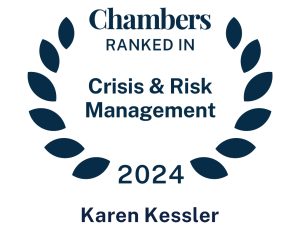If there’s anything the past few post-pandemic years have taught us, it’s that (A), working in sweatpants is much preferable to working in slacks, and (B), remote work affords employees an unprecedented and convenient ability to connect with others across the globe.
Conversations that once required meeting face-to-face behind closed doors can now easily be had via video conferencing platforms. Popular applications such as Zoom and Microsoft Teams make for convenient, easily accessible vehicles of communication. When utilized properly, lawyers can maintain attorney-client privilege while discussing ongoing legal matters via video conference. Boards of Directors can appoint new chairpersons before any decision is made public. Therapists can assist their clients without having to offer up the chaise lounge.
But as we know, these communication technologies are not always used properly.
Imagine you are a municipal clerk for a township in New Jersey, for example, and you are preparing to host a virtual township committee meeting. Elected officials convene at 7 p.m. in an executive session protected by confidentiality laws to discuss sensitive topics, such as litigation, proposed projects, personnel matters, etc. At 8 p.m., the public joins the meeting for open discussion.
To streamline required notetaking, you enable the virtual meeting platform’s implemented Artificial Intelligence (AI) capabilities to record, transcribe, and summarize both portions of the meeting.
Now imagine that, without your realizing, the AI-enabled virtual platform has been recording, transcribing, and summarizing the entire session – including the private executive portion. Once the meeting ends, the AI system automatically distributes meeting notes and transcripts to you as the meeting host—and all other attendees. The public now has access to confidential conversations, exposing the municipality to further legal action, public scrutiny, and damaged reputation.
As another example, imagine that a renowned restaurateur hosts a virtual call with a head chef at one of his restaurants. Together, the two discuss proposed menu changes, a potential rebrand of one of the restaurant’s flagship locations, and an internal response to a recent—but not yet public—health inspection concern. AI transcription and summarization tools are unknowingly enabled.
After the call ends, the AI software distributes a transcript of the conversation to a broad group of employees and external partners. Within hours, rumors spread about the proposed menu changes, patrons speculate on social media about food safety, and food bloggers seize the opportunity to publish insider “scoops.” The restaurant’s carefully cultivated reputation takes a hit, reservations drop, and a situation that could’ve been quietly managed becomes a full-blown crisis.
From a crisis communications perspective, there’s a lot at stake.
Erosion of internal trust. When private conversations are accidentally exposed, employees, executives, or elected officials may feel blindsided or betrayed. This can hinder open and honest dialogue, limit transparency within the organization, and ultimately hinder effective collaboration and decision-making.
Damage to your credibility. Sharing confidential and sensitive information can undermine public or stakeholder confidence – especially when legal or sensitive personnel matters are involved. Depending on the severity of the leak, it may take a significant amount of time to regain their trust.
Unwanted media attention. AI is a hot topic in the current media market, especially when it is tied to scandal or legal missteps. Reporters may dig deeper, publish follow-ups, and amplify the issue so that it remains in the news cycle.
Social media scrutiny and misinformation. Once information reaches local Facebook groups and other social media sites, speculation and misinformation are likely to take on a life of their own. Even if the posts are deleted, any screenshots will ensure the news lives on indefinitely.
So, what can be done to minimize the risk of this legal and communications snafu?
- Check the settings on your video conferencing platforms to ensure meeting notes are solely distributed to you, the host.
- Do not enable AI capabilities during privileged and confidential conversations.
- Engage a crisis communications firm to proactively develop a Crisis Communications Plan to help draft statements, phone scripts, talking points, Q&As, etc., to ensure you are prepared to address any scrutiny that may come your way.










